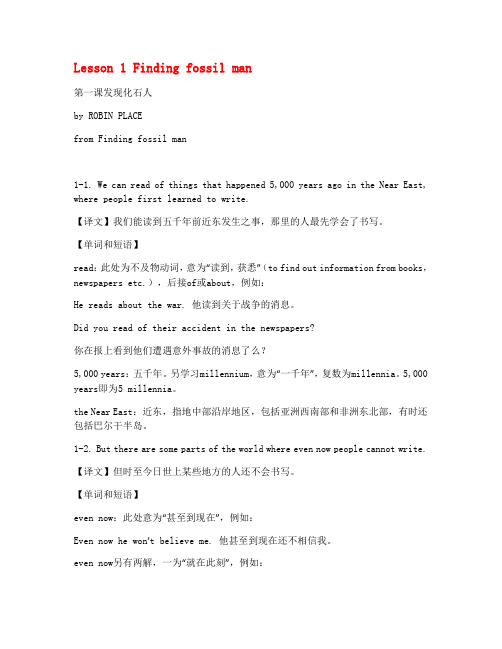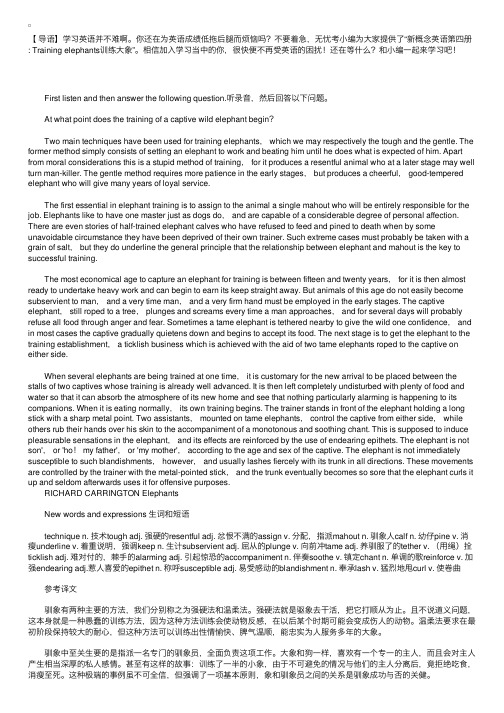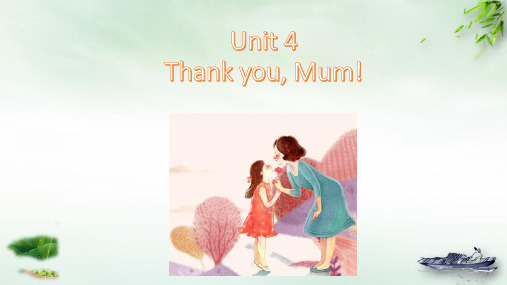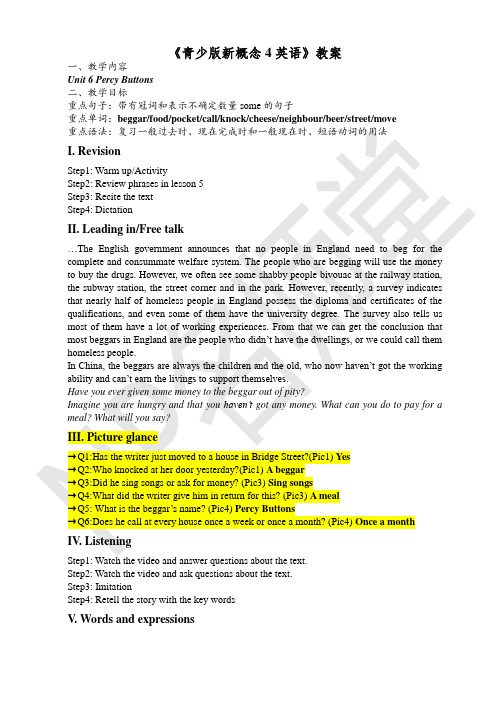新理念英语少儿四册复习Lesson 4-6
新概念英语第四册课文详解(L1-25)

Lesson 1 Finding fossil man第一课发现化石人by ROBIN PLACEfrom Finding fossil man1-1. We can read of things that happened 5,000 years ago in the Near East, where people first learned to write.【译文】我们能读到五千年前近东发生之事,那里的人最先学会了书写。
【单词和短语】read:此处为不及物动词,意为“读到,获悉”(to find out information from books,newspapers etc.),后接of或about,例如:He reads about the war. 他读到关于战争的消息。
Did you read of their accident in the newspapers?你在报上看到他们遭遇意外事故的消息了么?5,000 years:五千年。
另学习millennium,意为“一千年”,复数为millennia。
5,000 years即为5 millennia。
the Near East:近东,指地中部沿岸地区,包括亚洲西南部和非洲东北部,有时还包括巴尔干半岛。
1-2. But there are some parts of the world where even now people cannot write.【译文】但时至今日世上某些地方的人还不会书写。
【单词和短语】even now:此处意为“甚至到现在”,例如:Even now he won’t believe me. 他甚至到现在还不相信我。
even now另有两解,一为“就在此刻”,例如:Perhaps even now the time has arrived.也许正是此刻时机来到了。
另一为“尽管这样,虽然情况如此”(in spite of what has happened),例如:I have explained everything,but even now she doesn’t understand.我什么都解释了,但是尽管如此她还是不明白。
新概念英语第四册:Trainingelephants训练大象

【导语】学习英语并不难啊。
你还在为英语成绩低拖后腿⽽烦恼吗?不要着急,⽆忧考⼩编为⼤家提供了“新概念英语第四册: Training elephants训练⼤象”。
相信加⼊学习当中的你,很快便不再受英语的困扰!还在等什么?和⼩编⼀起来学习吧! First listen and then answer the following question.听录⾳,然后回答以下问题。
At what point does the training of a captive wild elephant begin? Two main techniques have been used for training elephants, which we may respectively the tough and the gentle. The former method simply consists of setting an elephant to work and beating him until he does what is expected of him. Apart from moral considerations this is a stupid method of training, for it produces a resentful animal who at a later stage may well turn man-killer. The gentle method requires more patience in the early stages, but produces a cheerful, good-tempered elephant who will give many years of loyal service. The first essential in elephant training is to assign to the animal a single mahout who will be entirely responsible for the job. Elephants like to have one master just as dogs do, and are capable of a considerable degree of personal affection. There are even stories of half-trained elephant calves who have refused to feed and pined to death when by some unavoidable circumstance they have been deprived of their own trainer. Such extreme cases must probably be taken with a grain of salt, but they do underline the general principle that the relationship between elephant and mahout is the key to successful training. The most economical age to capture an elephant for training is between fifteen and twenty years, for it is then almost ready to undertake heavy work and can begin to earn its keep straight away. But animals of this age do not easily become subservient to man, and a very time man, and a very firm hand must be employed in the early stages. The captive elephant, still roped to a tree, plunges and screams every time a man approaches, and for several days will probably refuse all food through anger and fear. Sometimes a tame elephant is tethered nearby to give the wild one confidence, and in most cases the captive gradually quietens down and begins to accept its food. The next stage is to get the elephant to the training establishment, a ticklish business which is achieved with the aid of two tame elephants roped to the captive on either side. When several elephants are being trained at one time, it is customary for the new arrival to be placed between the stalls of two captives whose training is already well advanced. It is then left completely undisturbed with plenty of food and water so that it can absorb the atmosphere of its new home and see that nothing particularly alarming is happening to its companions. When it is eating normally, its own training begins. The trainer stands in front of the elephant holding a long stick with a sharp metal point. Two assistants, mounted on tame elephants, control the captive from either side, while others rub their hands over his skin to the accompaniment of a monotonous and soothing chant. This is supposed to induce pleasurable sensations in the elephant, and its effects are reinforced by the use of endearing epithets. The elephant is not son', or 'ho! my father', or 'my mother', according to the age and sex of the captive. The elephant is not immediately susceptible to such blandishments, however, and usually lashes fiercely with its trunk in all directions. These movements are controlled by the trainer with the metal-pointed stick, and the trunk eventually becomes so sore that the elephant curls it up and seldom afterwards uses it for offensive purposes. RICHARD CARRINGTON Elephants New words and expressions ⽣词和短语 technique n. 技术tough adj. 强硬的resentful adj. 忿恨不满的assign v. 分配,指派mahout n. 驯象⼈calf n. 幼仔pine v. 消瘦underline v. 着重说明,强调keep n. ⽣计subservient adj. 屈从的plunge v. 向前冲tame adj. 养驯服了的tether v. (⽤绳)拴ticklish adj. 难对付的,棘⼿的alarming adj. 引起惊恐的accompaniment n. 伴奏soothe v. 镇定chant n. 单调的歌reinforce v. 加强endearing adj.惹⼈喜爱的epithet n. 称呼susceptible adj. 易受感动的blandishment n. 奉承lash v. 猛烈地甩curl v. 使卷曲 参考译⽂ 驯象有两种主要的⽅法,我们分别称之为强硬法和温柔法。
新概念英语青少版入门A Unit4 Thank you, Mum!

/b/ /ɔ/ /ɪ/
第三,纠正了“左”的策略,采取了正确的策略,孤立了敌人,巩固了根据地。 习作前小组交流,说说自己最想写什么,互相启发,打开思路。 1、注重倾听能力的培养,指导学生养成一边听一边思考的习惯。 第五层,预言南阳逃敌王凌云前途黑暗。 这里的引号表示特殊含义需要强调,指聋哑青年与其他观鱼人不同,爱鱼画鱼到痴迷的地步。
queen
/k/ /w/ /iː/ /n/
king
/k/ /ɪ/ /ŋ/
hurray
/h/ ay
/b/ /ɜː/ /r/ /θ/ /d/ /eɪ/
Homework: 背诵Unit 2、3的课文和单词 预习Unit 5的lesson 1-3
sun
/s/ /ʌ/ /n/
table
/t/ /eɪ/ /b/ /l/
umbrella
/ʌ/ /m/ /b/ /r/ /e/ /l/ /ə/
thank
/θ/ /æ/ /ŋ/ /k/
It’ ok.
You are welcome.
1、注重倾听能力的培养,指导学生养成一边听一边思考的习惯。 第一层,是导语,概述中原我军解放南阳,指出南阳守敌弃城南逃的背景、时间。 3.怎样写应试作文
新概念英语第四册学习手册【Lesson4、5、6】.doc

新概念英语第四册学习手册【Lesson4、5、6】为了方便同学们的学习,***为大家整理了新概念英语第四册学习手册,新概念英语作为一套世界闻名的英语教程,以其全新的教学理念,有趣的课文内容和全面的技能训练,深受广大英语学习者的欢迎和喜爱。
希望以下内容能够为大家的新概念英语学习提供帮助!新概念英语4 Lesson 4Seeing hands能看见东西的手How did Vera discover she had this gift of second sight?Several cases have been reported in Russia recently of people who can detect colours with their fingers, and even see through solid and walls. One case concerns and elevenyearold schoolgirl, Vera Petrova, who has normal vision but who can also perceive things with different parts of her skin, and through solid walls. This ability was first noticed by her father. One day she came into his office and happened to put her hands on the door of a locked safe. Suddenly she asked her father why he kept so many old newspapers locked away there, and even described the way they were done up in bundles.Vera's curious talent was brought to the notice of a scientific research institute in the town of Ulyanovsk, near where she lives, and in April she was given a series of tests by a special commission of the Ministry of Health of the Russian Federal Republic. During these tests she was able to read a newspaper through an opaque screen and, stranger still, by moving her elbow over a child's game of Lotto she was able to describe the figures and colours printed on it; and, in another instance, wearing stockings and slippers, to make out with her foot the outlines and colours of apicture hidden under a carpet. Other experiments showed that her knees and shoulders had a similar sensitivity. During all these tests Vera was blindfold; and, indeed, except when blindfold she lacked the ability to perceive things with her skin. It was also found that although she could perceive things with her fingers this ability ceased the moment her hands were wet.ERIC DE MAUNY Seeing hands from The ListenerNew words and expressionssolidadj. 坚实的safen. 保险柜Ulyanovskn. 乌里扬诺夫斯克commissionn. 委员会opaqueadj. 不透明的lotton. 一种有编号的纸牌slippern. 拖鞋blindfoldadj.& adv. 被蒙上眼睛的参考译文俄罗斯最近报导了几个事例,有人能用手指看书识字和辨认颜色,甚至能透过厚实的门和墙看到东西。
4新概念青少版1A_Unit4

4.Who is very busy? The doctor is.
5.Who is fine? Karen is.
Read after the radio
Guided conversation
Example : Karen / very well? (Who…?) A: Is Karen very well? B: Yes, she is. A: Who is very well? B: Karen is.
Robert/very hot? (who)
A: Is Robert very hot? B: Yes, he is. A: Who is very hot? B: Robert is.
Robert/very thirsty?( who)
A: Is Robert very thirsty? B: Yes, he is. A: Who is very thirsty? B: Robert is.
/u:/
/u:/ do you who ruler blue suit too
Karen: I’m not _s_u_r_e. He’s very __h_o_t. He isn’t _w_e_l_l.
3 Linda: Is he _h_u_n_gr_y? Karen: No, he __is_n_’t__ hungry.
4
Linda: Is he _t_h_ir_s_ty?
A
B
C
4
Linda: Is he thirsty? Karen: Yes, he’s very thirsty. Linda: Poor Robert. I am sorry.
青少版新概念4英语标准教案-U6

《青少版新概念4英语》教案一、教学内容Unit 6 Percy Buttons二、教学目标重点句子:带有冠词和表示不确定数量some的句子重点单词:beggar/food/pocket/call/knock/cheese/neighbour/beer/street/move重点语法:复习一般过去时、现在完成时和一般现在时、短语动词的用法I. RevisionStep1: Warm up/ActivityStep2: Review phrases in lesson 5Step3: Recite the textStep4: DictationII. Leading in/Free talk…The English government announces that no people in England need to beg for the complete and consummate welfare system. The people who are begging will use the money to buy the drugs. However, we often see some shabby people bivouac at the railway station, the subway station, the street corner and in the park. However, recently, a survey indicates that nearly half of homeless people in England possess the diploma and certificates of the qualifications, and even some of them have the university degree. The survey also tells us most of them have a lot of working experiences. From that we can get the conclusion that most beggars in England are the people who didn’t have the dwellings, or we could call them homeless people.In China, the beggars are always the children and the old, who now haven’t got the working ability and can’t earn the livings to support themselves.Have you ever given some money to the beggar out of pity?Imagine you are hungry and that you haven’t got any money. What can you do to pay for a meal? What will you say?III. Picture glance→Q1:Has the writer just moved to a house in Bridge Street?(Pic1) Yes→Q2:Who knocked at her door yesterday?(Pic1) A beggar→Q3:Did he sing songs or ask for money? (Pic3) Sing songs→Q4:What did the writer give him in return for this? (Pic3) A meal→Q5: What is the beggar’s name? (Pic4) Percy Buttons→Q6:Does he call at every house once a week or once a month? (Pic4) Once a month IV. ListeningStep1: Watch the video and answer questions about the text.Step2: Watch the video and ask questions about the text.Step3: ImitationStep4: Retell the story with the key wordsV. Words and expressions●beggar n. 乞丐beg v. 乞讨;恳求(原谅)e.g. There are a lot of beggars on the street.He begged me for a glass of beer.●food n. 食物Fast food/ food and drink/ juck food. (据说我们中国的食品是最营养的食品,很多西方的饮食习惯都不是很科学,尤其是肯德鸡、麦当劳都被称为juck food. )Enjoy your food. 用餐愉快●call v. 拜访,光顾n. phone calle.g. Please give me a phone call when you are free.v. call at+地点: visit some places call on sbe.g. I will call on you.=I will call at your home.call for 找e.g. The manager will call for you at seven.●pocket n. 衣服口袋pickpocket: 拣包的pick-pocket 扒手pocket money 零钱●move to/into/in/out a house●once per month/ once a month/ once every month./ once each monthtwice every two monthsVI. Grammar focus:1. Look at the pictures, introduce story, explain the phrases and grammar.2. Pay attention to the words: a、an、the、somea,an,the是冠词,冠词不能单独使用,它必须和名词在一起,但是冠词和名词之间可以插入修饰名词的其他词。
新概念英语第四册课文详解(L1-25)

Lesson 1 Finding fossil man第一课发现化石人by ROBIN PLACEfrom Finding fossil man1-1. We can read of things that happened 5,000 years ago in the Near East, where people first learned to write.【译文】我们能读到五千年前近东发生之事,那里的人最先学会了书写。
【单词和短语】read:此处为不及物动词,意为“读到,获悉”(to find out information from books,newspapers etc.),后接of或about,例如:He reads about the war. 他读到关于战争的消息。
Did you read of their accident in the newspapers?你在报上看到他们遭遇意外事故的消息了么?5,000 years:五千年。
另学习millennium,意为“一千年”,复数为millennia。
5,000 years即为5 millennia。
the Near East:近东,指地中部沿岸地区,包括亚洲西南部和非洲东北部,有时还包括巴尔干半岛。
1-2. But there are some parts of the world where even now people cannot write.【译文】但时至今日世上某些地方的人还不会书写。
【单词和短语】even now:此处意为“甚至到现在”,例如:Even now he won’t believe me. 他甚至到现在还不相信我。
even now另有两解,一为“就在此刻”,例如:Perhaps even now the time has arrived.也许正是此刻时机来到了。
另一为“尽管这样,虽然情况如此”(in spite of what has happened),例如:I have explained everything,but even now she doesn’t understand.我什么都解释了,但是尽管如此她还是不明白。
Kid's Box 剑桥少儿英语 第四册 第一单元 教案 Introductory Unit Book 4

《剑桥国际少儿英语》第四册教案
单元目标语言:
语词:职业(teacher, doctor, dentist, farmer, detective),家庭,形容词(funny, hungry, thirsty, loud, quiet, happy, clever, tired, young, old, beautiful, sad),日常活动,wear, routine, always, sometimes, never
结构:问候,形容词比较级(older than),描述人物,定义,一般现在时,频度副词,祈使句,love –ing, want to be, would like to, have got, must, before/after
单元技能目标:
听:听懂谈论日常活动的对话,弄清事件发生的先后顺序,能听懂关于人物描述的句子,能听出押韵的词。
说:能询问个人基本信息,描述人物,会用一般现在时态谈论日常活动,会唱一首英文歌。
读:能读懂描述人物日常生活的短文、小故事、歌词等。
写:能用描述人物的语言描写人物,能写出用一般现在时及频度副词描述日常活动的句子及短文。
第二课时Lesson 2
第五课时Lesson 5
第六课时Lesson 6。
- 1、下载文档前请自行甄别文档内容的完整性,平台不提供额外的编辑、内容补充、找答案等附加服务。
- 2、"仅部分预览"的文档,不可在线预览部分如存在完整性等问题,可反馈申请退款(可完整预览的文档不适用该条件!)。
- 3、如文档侵犯您的权益,请联系客服反馈,我们会尽快为您处理(人工客服工作时间:9:00-18:30)。
--Yes, they are .
句型转换
1.I am having class.(改为一般疑问句)
2.He is watching TV.(对划线部分提问) 3.They are playing football.(改为一般疑 问句)
Are they playing football?
What is he doing?
Are you having class?
4.I am reading book.(对划线部分提问)
Who is reading book?
Homework
12月27日
• 1.将Lesson1-6红色字体单词,每个抄3遍, 包括中文意思,拼读记忆。下次课小组听 写比赛(最佳组15张贝贝卡,鼓励组6张, 加油组3张) • 2.把L1-6活动手册完成,下次课交上来(每 个人检查一下,没完成的完成,不会做的 标上记号,告诉老师讲解) • 3.听录音并模仿朗读L1-6.
Lesson 4-6
walk
tall
short
draw
like
write
head
clean
dance
make
study
help
Dictation
• • • • • • • • • • 1、like 2、clean 3、dance 4、write 5、walk 6、study 7、draw 8、make 9、help 10、short
siomn complete
请做否定回答
1.pen、a 、She、new、e、?、computer、you
She has a new pen.
3.have、a computer、?、a mouse、Does
Do you have a computer?Yes,I do. No,I don Does a computer have a mouse? Yes,it does. No,it doesn't. Does a TV have a screen?
、Does、a、have、screen、a、?
用do,does,has,have进行句型转换
1.I have a computer.(改为一般疑问句)
2.He has a TV.(改为一般疑问句) 3.A computer has a mouse.(改为一般疑 问句)
Does a computer have a mouse?
screen
keyboard
computer
mouse
---Does a computer have a screen ---Yes,it does.
A computer has a mouse . Does a TV have a mouse too? ---No, it doesn't. This is a computer , it has a screen. Does a TV have a screen too? ---Yes, it does.
1.She is reading . 一般疑问句 Is she reading ?. 做肯定回答 --Yes,she is . 2.He is writing. Is he writing ?
--Yes, he is .
3.They are doing their homework. Are they doing their homework? 4.He is cooking. Is he cooking ? No,He isn't .he is swimming. What doing ? ? Whatis isshe he doing
将下列动词变为现在分词
• • • • • • help ______ • helping wash _____ • washing have _____ • having set _____ • sitting clean _____ • cleanning sleep _____ • sleeping cook ______ cooking empty emptying _____ make making ______ put ______ putting live ______ living sweep _____ sweeping
Does he have a TV?
Do you have a computer?
4.Does a monkey have a long tail?(改 为肯定句)
A monkey has a long tail.
reading
cook ing
cleaning
ing write
ing mak e
doing homework
Review 1-6
• • • • • 听写比赛 连读,升降调---背书、朗读p9,17,37 开闭音节单词a,e,i,o,u及辅音音素 L1-6活动手册批改与讲解 人称代词宾格,物主代词复习运用(依图 文造句) • 动词数的变换,do,have,现在分词变化 规律
helping running swimming
现在进行时的动词转换规律:
1、一般情况下,直接在动词后面加ing。 例如:go-going sing-singing 2、以不发音e结尾,去掉e加ing。 例如:make-making write - writing come-coming 3、末尾是元音加辅音,双写辅音加ing。 例如:sit-sitting run-running stopstopping
